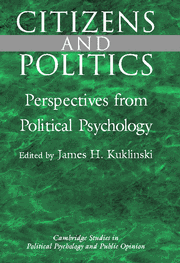Book contents
- Frontmatter
- Contents
- List of Contributors
- Prologue: Political Psychology and the Study of Citizens and Politics
- PART I AFFECT AND EMOTIONS
- PART II POLITICAL COGNITION
- Introduction
- 5 An Experimental Study of Information Search, Memory, and Decision Making During a Political Campaign
- 6 Political Accounts and Attribution Processes
- 7 The Motivated Construction of Political Judgments
- 8 Commentary: On the Dynamic and Goal-Oriented Nature of (Candidate) Evaluations
- PART III POLITICAL ATTITUDES AND PERCEPTIONS
- PART IV POLITICAL VALUES
- Index
- Titles in the series
5 - An Experimental Study of Information Search, Memory, and Decision Making During a Political Campaign
Published online by Cambridge University Press: 07 October 2011
- Frontmatter
- Contents
- List of Contributors
- Prologue: Political Psychology and the Study of Citizens and Politics
- PART I AFFECT AND EMOTIONS
- PART II POLITICAL COGNITION
- Introduction
- 5 An Experimental Study of Information Search, Memory, and Decision Making During a Political Campaign
- 6 Political Accounts and Attribution Processes
- 7 The Motivated Construction of Political Judgments
- 8 Commentary: On the Dynamic and Goal-Oriented Nature of (Candidate) Evaluations
- PART III POLITICAL ATTITUDES AND PERCEPTIONS
- PART IV POLITICAL VALUES
- Index
- Titles in the series
Summary
One of the most important questions in political science is “How do voters decide how to vote during a political campaign?” The decision-making process must involve some impression formation of (i.e., data gathering about) the candidates (alternatives) involved and a strategy for choosing amongst them. For a candidate with whom the voter is unfamiliar, the learning process is typically a gradual one. First, the voter will learn a name, a face, perhaps a party (particularly if the election is a primary), and the office for which the candidate is running. The face will convey gender, race, and general age, of course. Later, more detailed information may be learned: a few specific issue stands (Page, 1978), perhaps a general ideology (Levitin and Miller, 1979), and undoubtedly a more refined impression of the candidate's personality (Abelson, Kinder, Peters, and Fiske, 1982; Kinder, 1986; Miller, Wattenberg, and Malanchuk, 1986). The voter will learn what past positions the candidate has held (if any) and how well he or she performed in those positions. As the campaign progresses, information about the likely success of the candidate in this election, campaign strategies the candidate has adopted, and so on will become available (Patterson and McClure, 1976).
Most relevant information about politics is conveyed by the media. During presidential campaigns in the United States, it is almost impossible to avoid being exposed to information about the presidential election, although information about lesser offices is harder to come by.
- Type
- Chapter
- Information
- Citizens and PoliticsPerspectives from Political Psychology, pp. 136 - 159Publisher: Cambridge University PressPrint publication year: 2001
- 20
- Cited by



